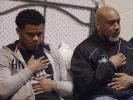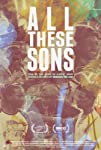Eye For Film >> Movies >> All These Sons (2021) Film Review
All These Sons
Reviewed by: Amber Wilkinson

"People look at these young people as being the problem but, man, they're actually the solution if you give them the chance."
Strong words, near the beginning of this documentary co-directed by Mind The Gap's Bing Liu and the Oscar-nominee's editor Joshua Altman, who pull up a chair to watch what is going on in two Chicago community programmes. The MAAFA Redemption Project is a Baptist Church-driven initiative on Chicago's West Side aiming to give young men who are at risk of becoming perpetrators or victims of gun violence a suite of opportunities to help them redefine themselves. Meanwhile, across on the city's South Side, the Inner City Muslim Action network (IMAN) also runs wellbeing, arts and educational programmes that aim to achieve a similar result.

The problems with gun violence in Chicago are well documented, so the directors don't have to do much to set the scene here, which means they can immediately shift the focus to the men at the projects' heart. Instead of dwelling on the statistics, they gesture towards the wealth of archive footage many people will have already seen in films like this before flipping to a more grassroots perspective, where the attitude of IMAN's Billy Moore and MAAFA's Marshall Hatch Jr, is that small interventions and a lot of persistence can make a big difference. As Moore sees it, there are only about 2,500-3,000 victims and perpetrators of gun violence in the city - which has a population of more than 2.7 million - which certainly makes the situation feel more hopeful than the news cycle would have you believe. Moore himself knows all about violence and its aftermath, having killed someone in the heat of the moment and served 20 years for the crime.
As wellbeing classes, where the men are encouraged to write their memoirs, interviews and study lessons is recorded, three of the men's stories rise to prominence. Lul Charles, whose being branded "a danger to society" almost strips him of any opportunity to make the change he hugely desires; Zay Manning, whose first-hand experience of gun violence has left him with PTSD; and in the film's strongest arc, Shamont Slaughter, a jack-the-lad type, who is grappling with an attempt to get his GED education certificate while straightening up and flying right for his pregnant girlfriend.
As their stories unfold, the directors - who also shot the film and edited it - weave in the wider backdrop. On the domestic front, this often includes absentee fathers, while more generally there's the city's divide between its black and white population, complete with underfunding, poor policing and low expectation of the chiefly black neighbourhoods, which has become so baked in down the decades, it can feel for many young men that gangs are the only option. As one of them puts it, "There's always something pulling you back in". By staying close to the men, with whom it's clear the filmmakers have created a trusting bond, dominant emotions start to emerge.
Chief among them are trauma and a fear of violence which - in a situation that mirrors that closer to home in many UK cities - leads the youngsters to carry weapons and, sometimes, to try to get their retaliation in first, fuelling the cycle of grief. The strong effect of this living in fear is particularly brought home on a trip to Washington. There, Shamont talks about the freedom he feels, as though he is in a film, just by being given an escape from his neighbourhood - although it is worth noting that Washington also faces deeply entrenched gun problems, fuelled by institutional racism, as articulated by the recent 17 Blocks.
The directors economically cover a lot of ground here and though there is no doubt much more to be said about the wider societal drivers, they give shape to the bigger picture while not losing focus on the individual portraits within it. They employ a small amount of animation to help fill in family back story with photos, but it's unfussy and used sparingly so as not to get in the way of the film's more general fly-on-the-wall feel. The directors even find time to, briefly, touch on the scrabble for funding, with one conversation questioning whether these men are really the "highest risk" speaking volumes about the cruel limitations of labelling.
These church groups aim to break the cycle, giving the men a rare safe space to articulate their feelings, offering them a different perspective of themselves and being persistent in their outreach to them even when the youngsters put up barriers or slip back into some of their old habits. Sticking to the path isn't easy and change neither happens overnight nor is, necessarily, a one way street, but this film shows that where there are people who are determined to keep offering an alternative and support, the future holds a lot of promise.
Reviewed on: 16 Jun 2021
















